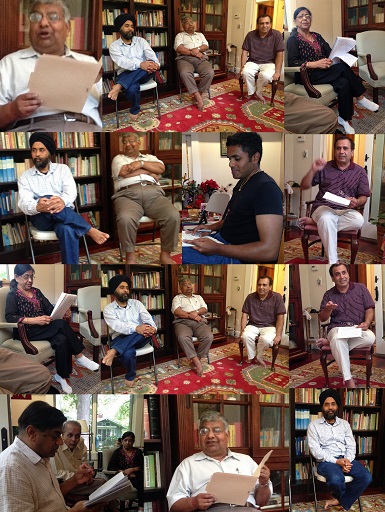Contribute
| South Asian Poets Of New England August Event |
Jay Shishupal
08/27/2014
This event was held at the residence of Dr. Bijoy Misra in Lincoln.. It was a warm and wonderful day with plenty of sunlight. We received welcome from very tall green trees and colorful flowers in the garden while entering the venue. Dr. Misra, the organizer and host for this event greeted the poets on their arrival. The meeting started with Dr. Misra’s remarks on the cultural diversity of South Asian Immigrants in the United States, issues faced by the community and how poets can contribute to unite and strengthen the community through their poems. His vision of represent a “voice of the people†was inspiring.
There was no specific “theme†for this event. Poets were given freedom to express their favorite poems. However, the majority of the poems reflected poet’s deep love and longing for their motherland. Poets recited poems in various languages that included Hindi, Gujarati, English, Punjabi and Urdu.
Nila Shah, a homemaker, grandmother, former teacher and an experienced poet recited two poems, “Ek Naya Hindustan Rachaye – Let us create a new Hindustan (India)â€. She expressed not only her dream for a better India, but also the issues such as unemployment, corruption, terrorism faced by India through her poem. She also mentioned the importance of unity among all Indians in order to create a new India. Second poem she recited was “Rakhiâ€, an Indian festival celebrated on the full moon in August every year. The poem explained the love, affection and the importance of the sacred relationship between the brother and the sister. The poem also expressed the sorrow of separation between the brother and sister.
Chandrakant Shah (Chandu Bhai), a businessman and Gujarati poet known for his character based poems in his published book “Blue Jeansâ€. He recited the Gujarati poem entitled “Letter to Ba- Letter to the Mother.†Through this poem he expressed the feelings and experiences of a girl who came to the United States from Vadodara (Gujarat, India) with her husband after getting married. The poem walked through the process of washing a blue jeans trouser and relating it to the actual experiences of the girl in her daily life that included the differences, unnaturalness and colorlessness she experienced in the new country. Chandubhai’s ability to read long sentences and short words with a long breath in a specific manner (“Katau†meter) was an admirable and pleasant experience for the listeners.
Syed Ali Rizvi is very active in literary circles and a poet who holds the profoundness and the legacy of Aligarh Urdu Poetry. His short and thoughtful rendition in Urdu (“Shairâ€) draws attention and receives admiration from the audience. He recited a poem written by Rana Sab in Urdu. The title was “MahajidNamaâ€. The poem expressed an immigrant’s perspective towards situations in the United States. It looked like a dialogue between an immigrant and the American. The poem reflected poet’s love for his motherland and sorrow for things that he left behind when he migrated to United States. The poem compared the ownership of assets, attachment to the relatives, and difference in the life style after immigration. Alibhai explained the Urdu words in layman’s term for the understanding for the audience.
Jjay Shishupal, recited a poem written in Hindi with a few words of Urdu on the volatile situation in Gaza . The poem was named as “Gaza†after recitation as suggested by other senior poets. The poem reflected the current environment and conflict between people associated with different faiths and land. It described the intensity and effects of this war on people as well as on coming generations. The poet reflected on the restlessness that the war has caused to the world through bloodshed and prayed to stop this war immediately.
Dr. Bijoy Misra recited his poem “Dialogue with my mind†written in memory of Sri Swami Sarvagatananda, a former chaplain for the students at MIT. The poem was written in English. As titled, it is the conversation between the poet and his mind where poet is trying to locate, understand, train and manage the mind. The poet explained the difficulties on the nature of the mind in order that it can be captured. The mind itself provides the guideline to locate, understanding and train it. The poet described the ability of mind to defend oneself in difficult situations. The poem had a deep intellectual message that said that the mind is the creation of individual and it can be trained and managed only by truth. Staying with truth is the only way to capture the mind.
Amandeep Singh, a Punjabi poet recited poem in Hindi which ended in Punjabi. The poem’s title was “Pardes†– Foreign land. In this heart-touching emotional poem, the poet expressed his deep love and attachment for his motherland. The sorrow of separation from loved ones and the motherland is creating a disturbance in the poet’s heart. The poet is wondering with whom and how he should share his pain. The poet’s attachment with motherland is unique and irreplaceable, but now this foreign land (USA) also looks to him as his own motherland!
In this SAPNE Summer Poetry meeting one could experience that poets are truly the people with special talent of imagination as well as expression. All the poems recited were immensely thoughtful, expressive, and full of emotions. We also felt the absence of other poets of SAPNE who could not join in this event because of the summer holidays.
SAPNE details and next meeting:
SAPNE stands for South Asian Poets of New England. This group currently has more than forty poets from various South Asian languages. The meetings are held in New England Area on a quarterly basis.
For more information or to join: Please visit our website www.sapne.us or contact Dr. Bijoy Misra at misra.bijoy@gmail.com or Sri Chandrakant Shah chandu420@gamil.com
The Next meeting is scheduled on November 15, 2014. 3PM, Location – TBD.
You may also access this article through our web-site http://www.lokvani.com/
